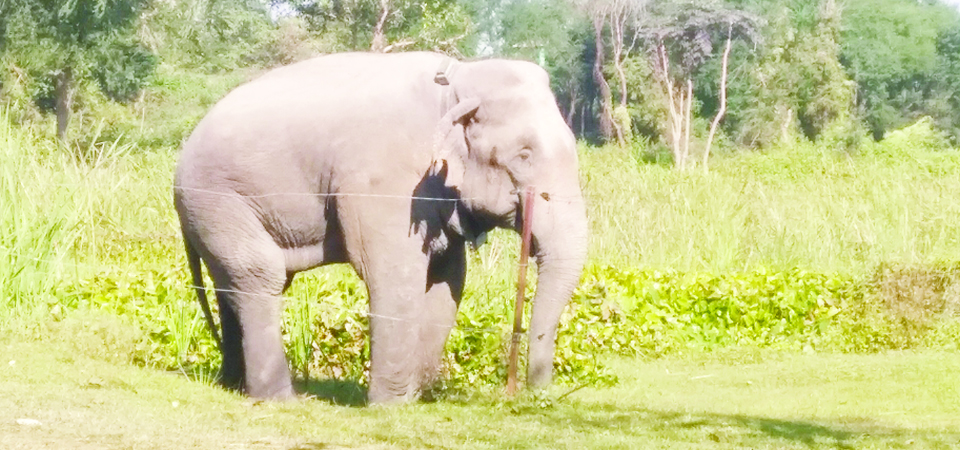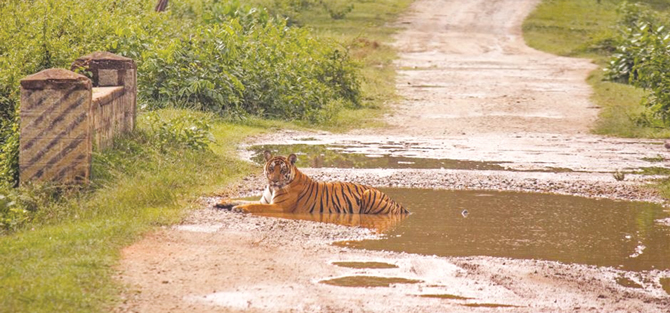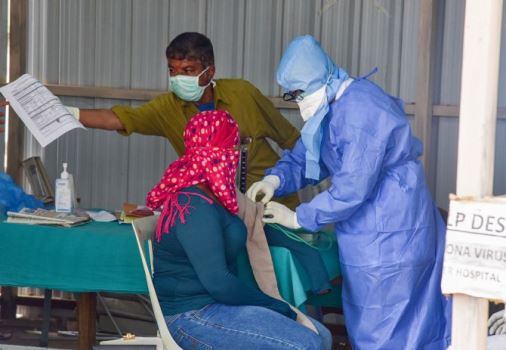Violent tusker calmer after treatment

By Indira Aryal
Kathmandu, Jan. 8: Makuna, the violent elephant at Koshi Toppu Wildlife Reserve (KTWR) has calmed down for now because of the efforts made by the wildlife experts and veterinarians, authorities said.
The elephant had killed Pramod Yadav, 32, of Koshi Rural Municipality-6, in Sunsari district, when he was in his wheat field on December 14, 2020. Yadav became the latest victim of the rogue elephant. After that incident, a team of wildlife experts, including a veterinarian, reached the site and started giving tranquilliser (a drug to reduce anxiety, tension) through darting.
Under pressure (by locals) to kill the elephant, the District Administration Office, Sunsari had sought the killing of the elephant in order to eliminate the threat , but discarded that plan in the wake of a barrage of criticisms from wildlife experts all over the country.
A team of experts from Chitwan National Park reached the site within a few days of that untoward incident, and started treating him immediately.
According to Ashok Ram, Chief Conservation Officer at KTWR, the elephant was under close monitoring of a team of Nepali Army and Park officials, along with a ranger, the team leader. A solar fence has been built on the eastern border of the park, which is close to a dense settlement, he said.
“It will be hard to identify the nature of wild animals and it is not certain whether Makuna will get better. Officials mobilised from CNP have been working relentlessly and watching its every movement, and they will stay there until the situation improves,” Ram explained.
The elephant has been left in Haripur, the core area of the park, and there have not been any report of damage of late.
Dr. Dinesh Neupane, wildlife expert and Program Director at the Resources Himalaya Foundation, said that giving tranquilliser was not a long-term solution, adding that the drug works for a certain period and after that the elephant could behave like it did before. “The medicines should be given time and again and they should be continued over a period. The long-term solution, however, would be to track the elephant and to alert the locals about the movement of such unruly elephant.”
According to Dr. Neupane, relocating the elephant breeding centre from the Park headquarters’ premises to inside the core area would reduce the chances of elephants’ coming out of the Park for mating and that could also minimise the human-wildlife conflict.
Installation of an early warning system, radio-collaring to track the movement of elephants and study about their behaviour are the long-term solution, which should be implemented, he said. “The elephant likes the smell of alcohol and if anyone consuming alcohol passes by, s/he might be attacked by an elephant, so the local bodies should also create awareness among the people when and how to move outside where the threats of elephant attack abound,” Dr. Neupane said.
Birendra Gautam, Programme Officer of the National Trust for Nature Conservation (NTNC), said that Makuna frequented the settlement during the night foraging for food but was not causing any harm. “It has calmed down after being given hormonal medicine and I hope it will remain that way in the days to come,” he said.
In addition to convincing the authorities to provide relief to those whose crops were destroyed by the elephants, they made the locals aware of the nature of elephants, along with advising them not to come out needlessly, especially during morning and evening time.
“Instead of regularly giving medicines to elephants, we should help in expanding their habitat within the reserve area so that they don’t feel the need to walk out to settlement areas seeking food, which I think would be the most important long-term solution if we are to minimize the threat of elephant attack,” Gautam said.
Recent News

Do not make expressions casting dout on election: EC
14 Apr, 2022
CM Bhatta says may New Year 2079 BS inspire positive thinking
14 Apr, 2022
Three new cases, 44 recoveries in 24 hours
14 Apr, 2022
689 climbers of 84 teams so far acquire permits for climbing various peaks this spring season
14 Apr, 2022
How the rising cost of living crisis is impacting Nepal
14 Apr, 2022
US military confirms an interstellar meteor collided with Earth
14 Apr, 2022
Valneva Covid vaccine approved for use in UK
14 Apr, 2022
Chair Prachanda highlights need of unity among Maoist, Communist forces
14 Apr, 2022
Ranbir Kapoor and Alia Bhatt: Bollywood toasts star couple on wedding
14 Apr, 2022
President Bhandari confers decorations (Photo Feature)
14 Apr, 2022









